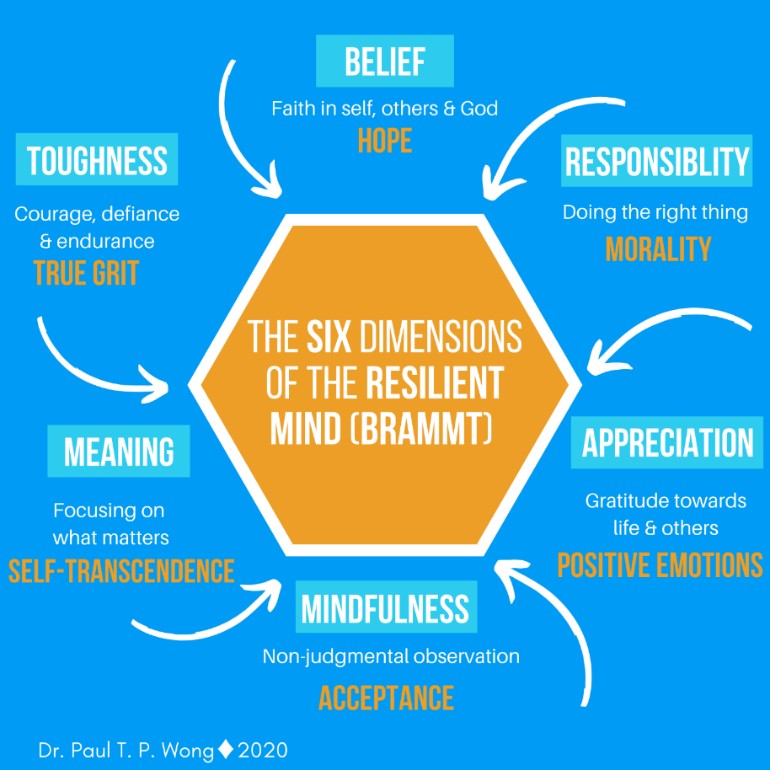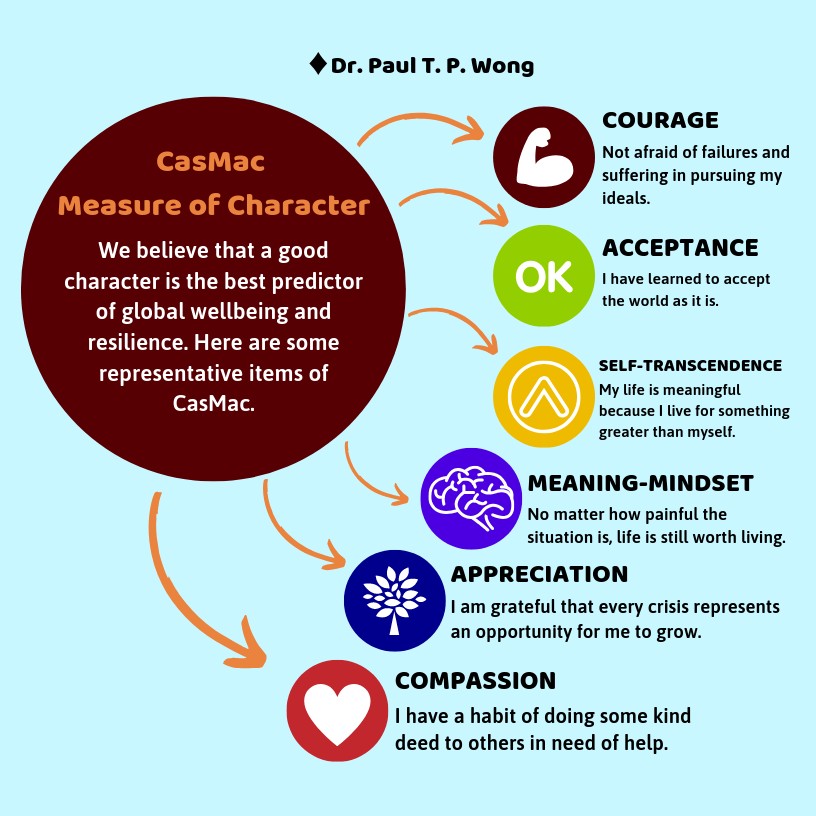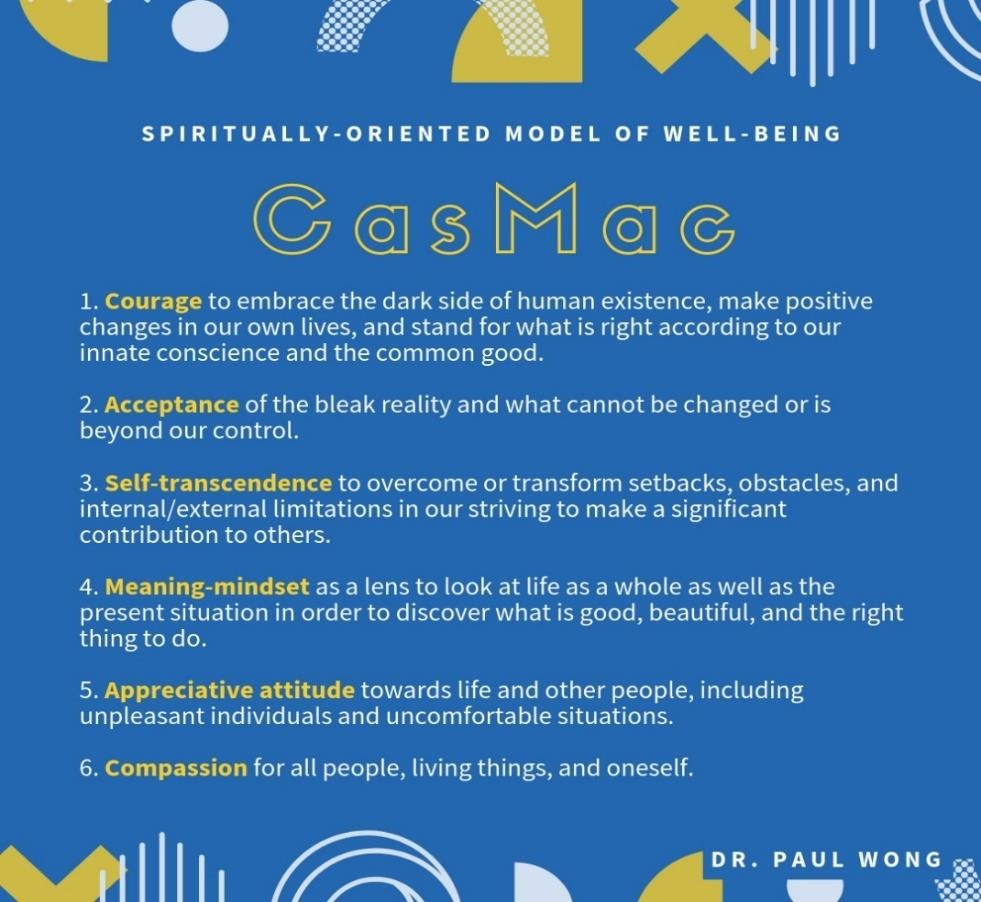Chapter 10 | Lesson On Mental Toughness: The Defiant Power Of Courage

Our mind tends to wander if it is not focused on a task or a distraction (Bradt, 2010). Therefore, during lockdown and isolation, the mind is even more likely to wander towards negative thoughts. I propose that a resilient mindset can serve to protect the mind from its negativity bias of wandering into the territories of worries, anxieties, and painful memories. There are six related aspects of the resilient mindset can be represented by the acronym TRAMMB (credits to fellow psychologist Yannick Jacob for this acronym):
1. Tough-mindedness towards threats, dangers, bad news, or painful thoughts;
2. Responsibility to choose how to respond to what happens in reality or inside your mind. You can either just witness it or choose an appropriate action;
3. Accepting what is beyond your control, such as limitations, injustices, your vulnerability, and the pandemic;
4. Mindfully observing everything with openness and compassion without judgment. This is often the first pass before deciding how to respond;
5. Meaningfully observing (i.e., looking for what is beautiful, good, and true) and deciding what is the right thing to do;
6. Believing in hope and possibilities; having faith in yourself, in people, and in God, or the mysterious transcendental realm beyond the limits of current science.

Cultivating these six ways of thinking and ways of looking at life will offer us the best protection and opportunity for creative thoughts and actions. By training you mind to be flexible enough to access any combination of these six aspects, you will be able to reduce your level of distress and anxiety.
from the perspective of existential positive psychology (PP 2.0), it is more adaptive to develop a more realistic view of human existence–which is full of suffering but also full of overcoming.
Therefore, resilience is not just a matter of bouncing back after a disruption, but about developing an existential way of thinking that emphasizes the courage, responsibility, and faith in the power of imagination, meaning-making, and connection with the cosmos or God in the face of death and suffering; such an existential worldview makes one more resistant to disruptions and trauma.
You Need CasMac to get Through the COVID-19 Crisis Stronger and Happier.
“What are the one or two things you want most for your children and for yourself?” “Happiness and success!”
That’s what all people want. Unfortunately, most people do not know how to achieve these objectives, and some even ruin their lives by using unethical means to get what they want. A greater concern is that the attitude of “I just want to be happy” will not prepare young people for the inevitable stress and sufferings in life; when the storm comes, they will collapse like a house built on the sand.
If I change the question to: “What are the one or two things you need most for your children and for yourself?”
“Good education and good job!”
That’s what all people want. Unfortunately, most people do not have the opportunities or money to receive a good education or get a good job. Furthermore, many people with good education and good jobs end up in jail because of greed, corruption, and other white-collar crimes.
If I again change the question: “What are the one or two things you really need in order to be happy and successful for your children and for yourself?”
No, it is not good education, nor a good job. My answer is “moral education” or “character building”, which will provide a rock-like foundation to build a fulfilling and successful life; it will remain standing, even when storms or tidal waves crash on it.
How do we Build This Rock-solid Foundation of Life?

Peterson and Seligman’s well- known character strengths and value-in- action (VIA) program immediately comes to mind, but their program is a mixture of “head virtue” and “heart virtue”; it is difficult to disentangle universal moral virtues from individual talents and personality traits in their six virtues.
It is also difficult to disentangle what is a universally valued virtue, and what is limited to individual differences in talents and interests in each character strength. Therefore, training that emphasizes an individual’s use of character strengths does not necessarily succeed in instilling universal moral values. I have consistently observed a wide gap in people’s use of their signature character strengths and the universal moral virtues supposedly reflected by their character strengths.
I am proposing an alternative CasMac model (figure 1) based on existential-spiritual values. The good thing about my model is that it is something that everyone can do, regardless of their circumstances or their individual differences in talents and abilities. Another good thing is that there is a great deal of empirical support for each of the factor’s importance for wellbeing and career success.
Figure 1
CasMac: Spiritually-Oriented Model of Wellbeing

True Grit Checklist (TGC)
© P. T. P. Wong, 2014
Please respond to the following statements by circling “Yes” or “No.”
|
1.
2.
3.
4.
5.
6.
7.
8.
9.
10.
|
Are you willing to defy authority in order to stand up for what is right?
Have you ever risked inconvenience or danger in order to help others?
Have you ever overcome obstacles and oppositions to pursue a worthy goal?
Have you ever taken on a task in spite of fear of failure and opposition?
Are you willing to endure hardships and setbacks in order to accomplish your life goal?
Are you willing to risk rejection in order to be true to your core value or belief?
Have you ever suffered because you chose principle over expediency?
Have you ever endured great difficulties and adversities in completing a big project?
Do you have something that is bigger than personal success and worth dying for?
Have you ever accomplished anything that initially seemed impossible?
|
Yes No
Yes No
Yes No
Yes No
Yes No
Yes No
Yes No
Yes No
Yes No
Yes No
|
CasMac Measure of Character (CasMac)
© Paul T. P. Wong, 2019
Please read each statement and indicate to what extent each item is characteristic of you. You may respond by circling / clicking the appropriate number according to the following scale:
|
1
|
2
|
3
|
4
|
5
|
6
|
7
|
|
Strongly Disagree
|
Disagree
|
Slightly Disagree
|
Neither Agree nor Disagree
|
Slightly Agree
|
Agree
|
Strongly Agree
|
|
1.
|
I never let obstacles or oppositions prevent me from doing what really matters.
|
1 2 3 4 5 6 7
|
CG
|
|
2.
|
I am not afraid to stand up for what is right or speak the truth, even if it may cost me personally.
|
1 2 3 4 5 6 7
|
CG
|
|
3.
|
I am not afraid of failures and rejections in pursuing my ideals or dreams.
|
1 2 3 4 5 6 7
|
CG
|
|
4.
|
I can face an uncertain and difficult future with courage and faith.
|
1 2 3 4 5 6 7
|
CG
|
|
5.
|
I accept my limitations.
|
1 2 3 4 5 6 7
|
AC
|
|
6.
|
I accept what cannot be changed.
|
1 2 3 4 5 6 7
|
AC
|
|
7.
|
I have learned to live with suffering and make the best of it.
|
1 2 3 4 5 6 7
|
AC
|
|
8.
|
I have learned to accept the world as it is.
|
1 2 3 4 5 6 7
|
AC
|
|
9.
|
My life is meaningful because I live for something greater than myself.
|
1 2 3 4 5 6 7
|
ST
|
|
10.
|
My suffering is more bearable when I believe that it is for my family, friends, and/or for a higher purpose.
|
1 2 3 4 5 6 7
|
ST
|
|
11.
|
I enjoy the process of striving towards excellence in what matters.
|
1 2 3 4 5 6 7
|
ST
|
|
12.
|
At my funeral, I want to be remembered as a decent human being who cared about others.
|
1 2 3 4 5 6 7
|
ST
|
|
13.
|
I can find something meaningful or significant in everyday events.
|
1 2 3 4 5 6 7
|
MG
|
|
14.
|
No matter how painful the situation, life is still worth living.
|
1 2 3 4 5 6 7
|
MG
|
|
15.
|
What really matters to me is to pursue a higher purpose or calling regardless of personal cost.
|
1 2 3 4 5 6 7
|
MG
|
|
16.
|
I can always transform negatives into positives through reframing of meaning.
|
1 2 3 4 5 6 7
|
MG
|
|
17.
|
My life is full of hardships and suffering, but I can still count my blessings.
|
1 2 3 4 5 6 7
|
AP
|
|
18.
|
I am grateful that my inner resources have increased as a result of overcoming adversities.
|
1 2 3 4 5 6 7
|
AP
|
|
19.
|
I am grateful that every crisis represents an opportunity for me to grow.
|
1 2 3 4 5 6 7
|
AP
|
|
20.
|
I have learned the importance of gratitude through suffering.
|
1 2 3 4 5 6 7
|
AP
|
|
21.
|
I often feel the pain of another human being.
|
1 2 3 4 5 6 7
|
CM
|
|
22.
|
It is my belief that we need to care for suffering people without judging them.
|
1 2 3 4 5 6 7
|
CM
|
|
23.
|
I have a habit of doing some kind deed to others in need of help.
|
1 2 3 4 5 6 7
|
CM
|
|
24.
|
I often feel moved by compassion seeing people waste their lives in pursuing pleasures and money.
|
1 2 3 4 5 6 7
|
CM
|
[Items 5, 6, 7] from Personal Meaning Profile-Brief (PMP-B), self-acceptance subscale (McDonald, Wong, & Gingras, 2012)
[Items 9, 10, 11, 12] from the Self-Transcendence Measure-Brief (STM-B) (Wong, 2017)
[Items 13, 14, 15, 16] from the Life Orientation Scale (LOS) (Wong, 2012)
[Items 17, 18, 19, 20] from the Existential Gratitude Scale (EGS) (Jans-Beken & Wong, 2018)







